Kukeri
Kukeri (Bulgarian: кукери; singular: kuker, кукер) are elaborately costumed Bulgarian men, and sometimes women, who perform traditional rituals intended to scare away evil spirits. Closely related traditions are found throughout the Balkans and Greece (including Romania and the Pontus). The costumes cover most of the body and include decorated wooden masks of animals (sometimes double-faced) and large bells attached to the belt. Around New Year and before Lent, the kukeri walk and dance through villages to scare away evil spirits with their costumes and the sound of their bells. They are also believed to provide a good harvest, health, and happiness to the village during the year.
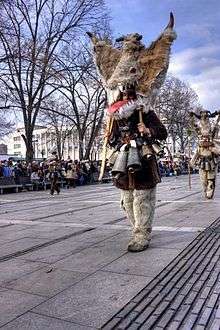
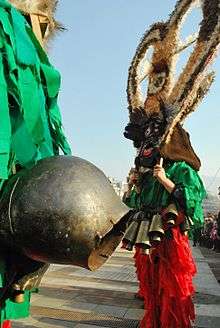
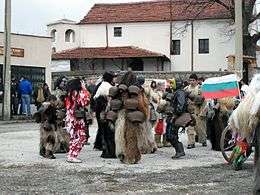
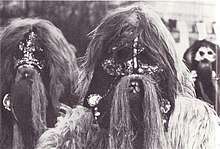
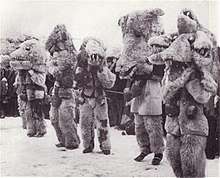
The kukeri traditionally visit peoples' houses at night so that "the sun would not catch them on the road." After parading around the village they usually gather at the village square to dance wildly and amuse the people. Kukeri rituals vary by region but remain largely the same in essence.
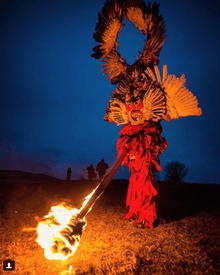
Distribution
The custom is generally thought to be related to the Thracian Dionysos cult in the wider area of Thracia. Similar rituals can be also found in much of the Balkans.[1] The name kuker has been derived from Latin cuculla meaning "hood, cowl" or cucurum, "quiver" (i.e. in the sense of a container; an abbreviation of koukouros geros).[2] Another theory suggests that the term could be derived from Proto-Slavic *kuka (“evil spirit”) with the agentive suffix *-ařь, i.e. literally meaning a "chaser of evil spirits".[3]
The corresponding figure in Greek-speaking Thrace is known as Kalogeros "rod-carrier", also shortened to cuci, in former Yugoslavia known as didi, didici, in Bulgaria as kuker or babushar, as momogeros in Pontic Anatolia. In Romania, this figure mostly appears together with a goat, known as capra, turca or brezaia.[4]
Kukeri
Kukeri is a divinity personifying fecundity, sometimes in Bulgaria and Serbia it is a plural divinity. In Bulgaria, a ritual spectacle of spring (a sort of carnival) takes place after a scenario of folk theatre, in which Kuker's role is interpreted by a man attired in a sheep- or goat-pelt, wearing a horned mask and girded with a large wooden phallus. During the ritual, various physiological acts are interpreted, including the sexual act, as a symbol of the god's sacred marriage, while the symbolical wife, appearing pregnant, mimes the pains of giving birth. This ritual inaugurates the labours of the fields (ploughing, sowing) and is carried out with the participation of numerous allegorical personages, among which is the Emperor and his entourage.[1]
Capra
Capra comes from the Latin capra, meaning goat. A halo like head piece was worn as a crown to symbolize the spiritual divine realm. While animal fur, bird feathers and the sort were worn to symbolize nature. The fact that nature has good and evil, and that humans are the intermediary between spirit and nature. It was a time to pay homage to the Spieth gods. Some cultures imbibed in human flesh to satiate the gods thirst for blood, as an act of solidarity for the gods.
Kukeri in the media
Kukeri or Kuker Warriors are some of the main characters in the epic fantasy animated series The Golden Apple, which is currently being developed by Studio Zmei. In it, young brothers Bran and Vlad have been trained as Kuker Warriors to fight evil spirits but they have to question what they have been taught when they are forced to team up with half-spirit Vihra and Samodiva-spirit Tina in order to protect their world.[5][6]
Kukeri are featured in the music video for the song "Fish on", by the industrial metal band Lindemann, and in the film Toni Erdmann, directed by Maren Ade.
See also
- Acta Dasii
- Phallic processions
- Kourbania
- Careto
- The Kukeri Nunataks, rock formations on Livingston Island in the South Shetland Islands, Antarctica are named after the Bulgarian Kukeri.
References
| Wikimedia Commons has media related to Kukeri. |
- Kernbach, Victor (1989). Dicţionar de Mitologie Generală. Bucureşti: Editura Ştiinţifică şi Enciclopedică. ISBN 973-29-0030-X.
- W. Puchner, Studien zur Volkskunde Südosteuropas und des mediterranen Raums, 2009, p. 180 fn. 32.
- Колева-Златева, Живка (2012): К этимологии болг. кукер (On the etymology of Bulg. kuker) (in Russian)
- W. Puchner, Studien zur Volkskunde Südosteuropas und des mediterranen Raums, 2009, p. 276.
- https://goldenappleseries.com/
- https://www.indiegogo.com/projects/the-golden-apple-animated-series-pilot-episode-fantasy-animation#/
External links
- "Startsi-Kukeri-Mummers of Karlovo Region, Bulgaria". Kukeri Foundation. Archived from the original on 2012-03-30. Retrieved 2011-10-23.
- http://kukeriwines.com/
- http://www.surva-bg.com/
- http://www.kukerlandia.com/en/